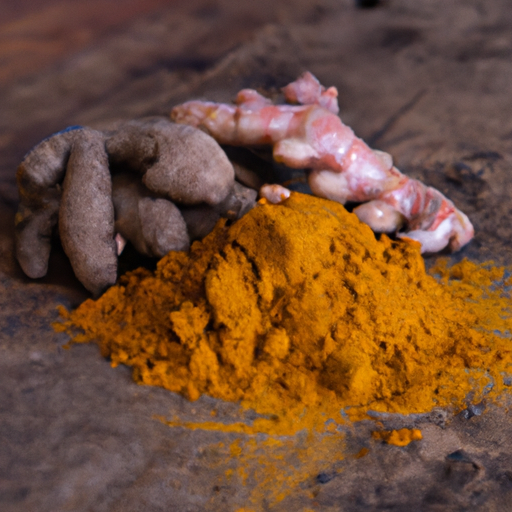I know what you’re thinking – another health trend claiming to have miraculous benefits. But before you dismiss it as just another fad, let me share with you some fascinating information about turmeric and its potential to help with inflammation.
Inflammation is a natural response by our body to injuries or infections, but when it becomes chronic, it can lead to various health issues. Many people are turning to turmeric, a vibrant yellow spice commonly found in curry, for its reputed anti-inflammatory properties.
But is there any truth to these claims? Can turmeric really help with inflammation? In this article, we will explore the history and traditional use of turmeric, delve into the science behind its anti-inflammatory properties, examine evidence from clinical studies, and discuss how you can incorporate turmeric into your diet for inflammation relief.
We will also touch upon potential side effects and precautions, as well as other health benefits of turmeric. So, let’s dive in and find out if turmeric is worth considering as a natural remedy for inflammation.
Key Takeaways
- Turmeric contains curcumin, which has anti-inflammatory properties and can help regulate the body’s response to inflammation.
- Turmeric has been found to reduce levels of inflammatory markers in the body and relieve pain associated with inflammatory conditions like arthritis.
- Turmeric can be easily incorporated into the diet through various recipes or taken as a supplement for convenience.
- While turmeric may not work for everyone and can have potential side effects, there are alternative natural remedies for inflammation such as ginger, bromelain, and omega-3 fatty acids.
The History and Traditional Use of Turmeric for Inflammation Relief
If you were to delve into the rich history and traditional use of turmeric, you’d discover that this vibrant spice has long been revered for its remarkable ability to provide relief from inflammation.
Turmeric has been used for centuries in traditional medicine practices such as Ayurveda and Traditional Chinese Medicine to alleviate various inflammatory conditions. Its use can be traced back thousands of years to ancient civilizations in India, where it was valued for its medicinal properties.
Turmeric was used to treat a wide range of ailments, including arthritis, digestive disorders, and skin conditions. The traditional use of turmeric for inflammation is rooted in the belief that its active compound, curcumin, possesses powerful anti-inflammatory properties.
Moving from the historical and traditional use of turmeric to the scientific evidence behind its anti-inflammatory effects, it becomes clear that turmeric’s potential goes beyond its traditional use.
The Science Behind Turmeric’s Anti-Inflammatory Properties
Explore the astounding scientific evidence that reveals how turmeric’s remarkable properties can soothe and alleviate the discomfort caused by inflammation. Turmeric has been studied extensively for its impact on chronic diseases, and the results are promising.
The active compound in turmeric, called curcumin, has been found to possess powerful anti-inflammatory properties. It works by inhibiting the activity of inflammatory enzymes and molecules in the body, effectively reducing inflammation. Additionally, turmeric has been shown to modulate the immune system, helping to regulate the body’s response to inflammation. This dual action of turmeric makes it a valuable tool in managing chronic inflammation and its associated symptoms.
Numerous studies have demonstrated the effectiveness of turmeric in reducing inflammation, paving the way for its potential use as a natural remedy. Transitioning into the next section, let’s delve into the evidence from clinical studies on turmeric’s effectiveness.
Evidence from Clinical Studies on Turmeric’s Effectiveness
Discover the exciting results from clinical studies that prove how turmeric’s powerful anti-inflammatory properties can effectively soothe and alleviate discomfort caused by inflammation, making it a valuable tool in managing chronic inflammation and its associated symptoms. Here are three key findings from these studies:
-
Reduced inflammation markers: Clinical trials have shown that turmeric supplementation can significantly reduce levels of inflammatory markers, such as C-reactive protein (CRP) and interleukin-6 (IL-6), in the body.
-
Pain relief: Research has demonstrated that curcumin, the active compound in turmeric, can help relieve pain associated with inflammatory conditions like arthritis. It does so by inhibiting the production of inflammatory molecules and reducing pain perception.
-
Improved joint function: Studies have indicated that turmeric supplementation can improve joint function and reduce stiffness in individuals with osteoarthritis, leading to enhanced mobility and quality of life.
Incorporating turmeric into your diet for inflammation relief is easy and can be done through various methods.
[Transition to the subsequent section: ‘Learn how to incorporate turmeric into your diet for inflammation relief.’]How to Incorporate Turmeric into Your Diet for Inflammation Relief
Boost your daily meals with the powerful anti-inflammatory benefits of turmeric by easily incorporating it into your diet. Turmeric can be added to a variety of dishes, making it a versatile ingredient for inflammation relief. For beginners, simple recipes like turmeric roasted vegetables or turmeric golden milk can be a great way to start. Additionally, turmeric supplements are available for those who prefer a more convenient option. When using supplements, it is important to follow the recommended dosage and consult with a healthcare professional. To help you get started, here is a table with four easy turmeric recipes for beginners:
| Recipe | Ingredients |
|---|---|
| Turmeric Roasted Vegetables | Assorted vegetables, olive oil, turmeric, salt, pepper |
| Turmeric Golden Milk | Turmeric, milk (dairy or plant-based), honey, cinnamon |
| Turmeric Smoothie | Banana, spinach, almond milk, turmeric, ginger, honey |
| Turmeric Quinoa Salad | Quinoa, cucumber, cherry tomatoes, red onion, turmeric dressing |
Incorporating turmeric into your diet can be a delicious and effective way to manage inflammation. However, it is important to be aware of potential side effects and precautions when using turmeric.
Potential Side Effects and Precautions When Using Turmeric
Be cautious when using turmeric in your diet, as with any powerful ingredient, because too much of a good thing can sometimes have unintended consequences. Turmeric is generally safe when consumed in moderate amounts, but it’s important to be aware of potential side effects and take necessary precautions.
Here are some things to keep in mind:
-
Stomach upset: Taking high doses of turmeric may cause gastrointestinal issues such as nausea, bloating, or diarrhea.
-
Blood thinning: Turmeric has natural blood-thinning properties, so individuals on blood-thinning medications should exercise caution and consult their healthcare provider.
-
Allergic reactions: Although rare, some individuals may experience allergic reactions to turmeric, such as rash, itching, or difficulty breathing.
It’s important to note that these side effects are generally mild and uncommon, but it’s always best to consult with a healthcare professional before incorporating turmeric into your diet.
Moving forward, let’s explore the other health benefits of turmeric.
Other Health Benefits of Turmeric
One incredible advantage of incorporating turmeric into your diet is its ability to support brain health. Turmeric has been used for centuries as a natural remedy for various ailments, and recent studies have shown promising results when it comes to its effects on the brain. Curcumin, the active compound in turmeric, has been found to have anti-inflammatory and antioxidant properties, which can help protect the brain from damage caused by inflammation and oxidative stress.
Additionally, turmeric has been shown to enhance brain function and improve memory and cognition. In addition to its benefits for brain health, turmeric is also known for its positive effects on skin health. Its anti-inflammatory properties can help reduce redness and irritation and promote a healthy complexion.
Transitioning into the next section, turmeric’s numerous health benefits make it an intriguing option for those seeking inflammation relief.
Conclusion: Should You Try Turmeric for Inflammation Relief?
After exploring the various health benefits of turmeric, it is time to address the burning question: should you try turmeric for inflammation relief? While turmeric has shown promising results in reducing inflammation, it is important to remember that it may not work for everyone. In some cases, individuals may experience side effects or allergic reactions. Moreover, there are alternative natural remedies available that can also help with inflammation. It is always a good idea to consult with a healthcare professional before incorporating turmeric or any other natural remedy into your routine. They can provide personalized advice based on your specific health needs and guide you towards the most suitable options. Ultimately, the choice to try turmeric or explore other alternatives for inflammation relief is a personal one that should be made with careful consideration and expert guidance.
| Pros of Turmeric for Inflammation | Cons of Turmeric for Inflammation | Alternative Natural Remedies for Inflammation |
|---|---|---|
| Anti-inflammatory properties | Potential side effects | Ginger |
| Antioxidant effects | Allergic reactions | Bromelain |
| Pain relief | Interactions with medication | Omega-3 fatty acids |
Frequently Asked Questions
Can turmeric be used as a substitute for medication in treating inflammation?
As an alternative to medication, turmeric can be used as a powerful anti-inflammatory agent. Studies suggest that it can be just as effective as traditional medications in providing relief from inflammation.
What is the recommended daily dosage of turmeric for inflammation relief?
The recommended daily dosage of turmeric for inflammation relief varies depending on the individual and the severity of the condition. It is important to consult with a healthcare professional for personalized advice. Studies have shown that turmeric can be effective in reducing inflammation when used in appropriate amounts.
Are there any specific medical conditions or medications that may interact negatively with turmeric?
Potential drug interactions and contraindications of turmeric should be considered. It is important to consult with a healthcare professional, especially if you have specific medical conditions or are taking medications, to determine if turmeric is safe for you.
Can turmeric be used topically to treat localized inflammation?
Turmeric can be used topically for localized inflammation, but its effectiveness is not well-established. Some studies suggest it may help, but more research is needed. Possible side effects include skin irritation or allergic reactions.
Are there any long-term effects of using turmeric for inflammation relief?
Long term effectiveness of turmeric for inflammation relief has been shown in some studies. However, potential side effects such as gastrointestinal issues and allergic reactions should be considered.
Conclusion
In conclusion, after exploring the history, science, and clinical studies surrounding turmeric’s anti-inflammatory properties, it’s evident that incorporating this golden spice into your diet can potentially provide relief from inflammation. However, it’s important to note that individual results may vary, and it’s always advisable to consult with a healthcare professional before making any significant changes to your diet or lifestyle.
While turmeric offers numerous health benefits, it’s essential to be aware of potential side effects and precautions. Overall, turmeric shows promise as a natural remedy for inflammation relief, but further research is needed to fully understand its effectiveness.










